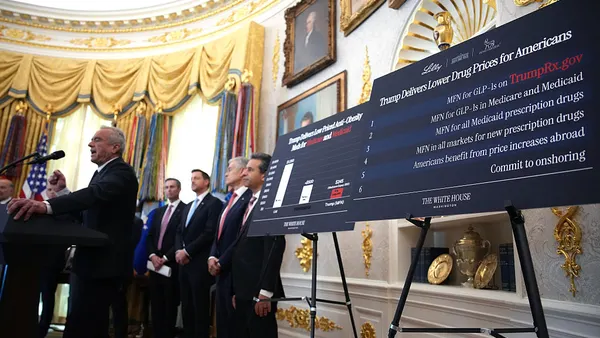6 Au gu s t 2 00 3 PharmaVOICE RAISE your voice The key is in the details As a physician and medical educator, I want to offer the doctors’ viewpoint regarding the article “Ask It the Right Way” (PharmaVOICE, June 2003). I whole heartedly agree with the author that most “representatives seem to ask the same questions that everyone else asks.” But, the real issue is that doctors want and need information and want to have a discussion, not be probed to death. One of the main reasons that we doctors are frustrated and become “diffi cult to see” or “no see” is that many representa tives waste our time by bombarding us with all kinds of questions: probing, layered, focused, recital, trial, open, closed … you name it. The key to connecting with doctors is infor mation/education. To practice the best most up todate medicine possible, we have to constantly educate ourselves through journals, meetings, all types of CME and yes, pharmaceutical representa tives. Education and discussion are the ways that we were trained and how we learn about and decide which products to use. The healthcare edu cation literature documented this 20 years ago. Fifteen to 20 years ago, pharmaceutical rep resentatives were called “detail” people because they brought details. Now they are referred to as “sales” people because they bring sales mod els (opening, closing, questioning skills, etc.). If reps understand the mindset of doctors, they realize that we are expert questioners. It’s what we do for a living. So, it’s not about repre sentatives being able to ask questions in a better way. It’s about getting us to ask representatives questions to gain the information we want and need to be able to use a drug or product. So, more sales questioning skills are not the solution. The proven solution is for the representative to inform and educate us first before bombarding us with questions. Then they need to ask ques tions that draw us into a discussion so we ask them questions. But just as important is the abil ity of representatives to be able to answer our questions. If reps can’t answer our questions because they don’t know their stuff, then it does n’t matter which questions they ask. The doctor won’t perceive them to be a valuable resource and will deny them either mental or physical access. The industry says it takes an average of six to eight calls to get a doctor to use a new product. The reason it takes this many calls is that many representatives waste calls by asking too many questions and not giving the doctors the infor mation they need to make a favorable decision to use their product. If representatives give the right information in the right way, the doctor will nat urally ask the “right” questions to make a favor able decision to use their product. Michael Kessler, M.D. A conference update I had the pleasure to chair the May 21 after noon session at the IIR Partnerships in Clinical Trials Forum in Lyon, France. The session fea tured four presentations. I was concerned that the range of subjects they covered lacked a com mon thread that would connect them and estab lish a useful context for the audience. By the end of the fourth presentation, I was delighted to realize that my concerns were unfounded. John Hough, sourcing manager at Pfizer UK, began the afternoon session with a presen tation that included an evaluation of the range of CRO/sponsor relationships — from exclu sively tactical to a true partnership. John developed a convincing argument that a full partnership between a CRO and a sponsor is not always desirable. For example, he suggested that there are times when a lowerlevel relation ship provides a better fit for the needs and objec tives of both parties. John emphasized that the key to success is that both parties must define and understand the type of relationship that they are entering. John’s identification of the similarities between industry and personal relationships drew laughter from the audience when he stated that a lot of effort and frustration is avoided when someone simply says “let’s just be friends” at the beginning of the relationship. I sensed the emergence of a common thread when the speakers giving the second presentation affirmed that the key to a successful relationship is the development of a clear understanding of roles and objectives of all parties from the begin ning of the affiliation. Dr. John Court of Fulcrum Pharma and Dr. Jaime Grego of Laboratorios Leti cited the structure of the numerous collabora tions between their organizations as a model for others to follow when contemplating the use of a strategic drugdevelopment service to execute drugdevelopment programs. Their companies have worked together from project design to exe cution and delivery on several important studies, and John and Jaime attributed their many suc cesses to the clear understanding of key compe tencies and plainly expressed (and documented) understanding of roles. Dennis LaCroix of Genzyme and Samir Shah of ReSearch Pharmaceutical Services (RPS) pro vided a very entertaining presentation on the rather grim subject of professional divorce. Because he drew upon his actual experience of terminating one CRO and transitioning to another (RPS) during a trial, Dennis was able to offer practical, proven guidance on what to do in such an unfortunate circumstance. Samir discussed the importance of clearly defin ing the roles of all parties (in this case, RPS, Gen zyme, the outgoing CRO, and the investigator sites). The afternoon was closed by an excellent pre sentation from Jane Winter of Pharma Business Solutions. Jane’s assessment of the European SMO industry identified the variety of organizations operating under the broad SMO umbrella. Her presentation also included practical guidance on how SMOs can offer solutions to patient recruit ment challenges across Europe. She concluded that the key to a successful partnership is the clear dec laration of roles at the earliest possible date. Ken Newport SENIOR VP, BUSINESS DEVELOPMENT PRA INTERNATIONAL INC. The real issue is that doctors want and need information and want to have a discussion, and not be probed to death. — Michael Kessler, M.D. LETTERS The key to connecting with physicians is information
An article from










